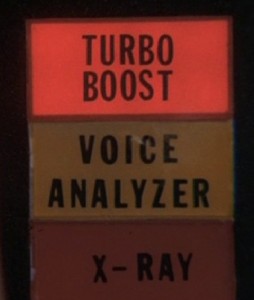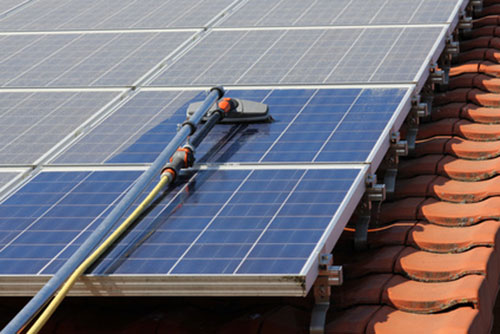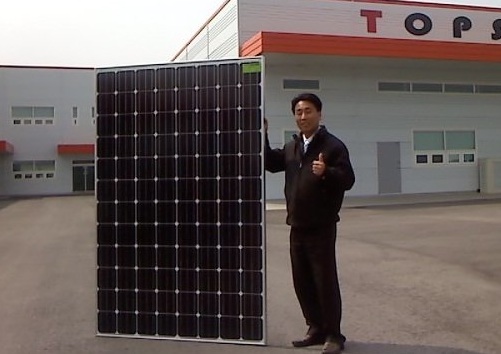Peak oil has either hit us, or is likely to arrive any time soon depending on the report or opinion you read. The scarcity of this resource (and the undoubted price gouges that will accompany its dive down the supply curve) will force policymakers to completely rethink the way our economy’s energy needs are structured as the resource that has driven our lives since the Industrial Revolution rapidly dries out. So, solar energy innovation anyone? [Read more…]
Solar Panel Orientation: Is West the new North?
The following is a very common question that comes in to SQ HQ.
“My roofline is North/South, so my largest roof areas face either East or West. I have been told that North Facing is ideal, but I have a tiny North facing roof! Can I put some solar panels on the East or West Facing roof (or both) ?”
Short Answer: Stick some (perhaps all) on the West!
Longer Answer: In terms of the amount of power produced, facing your panels East will produce exactly the same amount of power as facing them West. In either case you’ll generally take a 10-15% power hit compared to having them facing the ideal direction (North).
So why do I say “probably West” as the short answer to the question?
Well, the reason I err on the West facing roof is because that part of your roof will get the sun later in the day. An East Facing solar array will generally produce its peak power at 10-11am. A West Facing array will produce its peak at closer to 2pm.
Most people use more energy later in the day. And most people want to use as much of their solar energy as possible, without exporting it. Why? Because at the time of writing most Feed In Tariffs give you less per kWh if you export the electricity than you pay for imported electricity. So most people will pay off their solar system quicker if they minimise exports.
Solar panel energy payback: What’s the truth?

20 years ago that was a valid argument against solar power. However in 2012 that myth is pure BS. Hopefully this post can set the record straight.
Sydney University’s upconversion solar cell breakthrough
Some major news on a local technological breakthrough for solar cells this week folks. This, as always, gives your columnist the opportunity for some more shameless cheerleading on behalf of Australian solar watchers, in the increasing wasteland of government support for domestic solar systems.
(For help, see Finn’s latest article on how to future proof your PV system from perfidious state and federal governments.)
To begin with the Mexican wave (or Sydney University wave to be more precise) part of the article. An April 18 press release from the university has stated that Associate Professor Tim Schmidt, from the university’s School of Chemistry, has partnered with colleagues from the [Read more…]
Dubbo: Solar Power Capital of Australia!
Well done Dubbo solar power installers!
If you read the mainstream press in Australia, you’d think the towns and suburbs with the biggest average take up of solar panels would be the well-to-do inner city suburbs of our major cities. Perhaps Vaucluse, Toorak or the leafy eastern suburbs of Adelaide?
Obviously they’d be more likely where wealth is concentrated right?
Wrong (as you may have guessed by the headline!). In a sign that solar energy is becoming more accessible to mainstream Aussie folk, a recent survey by the Clean Energy Council (CEC) found the central-west NSW city of Dubbo to have the highest average percentage of houses with solar panels.
Q-Cells file for bankruptcy but are saved by Korean Hanwha Solar
The German press has just announced that one of my favourite solar companies plans to file for insolvency tomorrow (April 4th).
Why Your 5kW Solar System Output Is Lower Than You Expected
Is your new solar system producing the power output it should?
A very common question I get from people who have just got a new solar power system is: “Now the solar panels are on my roof, how do I know what the solar system output should be?”.
The solar power system owners are usually a bit concerned because they have bought, for example, a 5kW system but their inverter is telling them that they only got 4kW of peak power yesterday! Where’s the missing 1kW? Most people expect a 5kW solar system output!
New generation of super thin solar cells promise half price solar power
Last week’s column brought you the latest, world-record-breaking achievements of the University of NSW. This week, just to balance the books a little, we thought we’d bring you news of the latest incredible overseas advance in PV cells from overseas — just to prove that solar research is pushing back the boundaries the world over.
The name of the firm is Twin Creeks, which may or may not be a nod to the superb David Lynch-produced TV series of the early nineties (or am I showing my age here?), and the breakthrough is that photovoltaic cells are created using a hydrogen ion particle accelerator. [Read more…]
PV world record tumbles as UNSW looks to wrap up series
Aussies love awards and stellar achievements. Particularly when we’re on the receiving end. Best and fairest, most valuable player, player of the series, best supporting actor, Treasurer of the Year (hang on!) and so the list goes on. Our collective chests burst with pride when we hear of the achievements and world records of our sports and silver screen idols and this gives us a sense of playing on the world stage with the big boys/girls. [Read more…]
Solar Panel Size: Is Bigger Better?
The Size of Solar panels is definitely increasing, there’s no denying it.
A couple of years ago the average solar panel was 165W. Today the average is about 240W. The biggest one approved for installation in Australia at the time of writing is the whopping Topsun TS-S410. This giant amongst solar panels has these super sized stats: [Read more…]









 RSS - Posts
RSS - Posts



Currently Raging Debates: